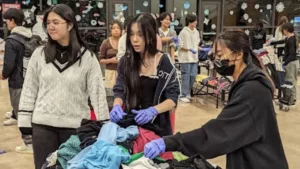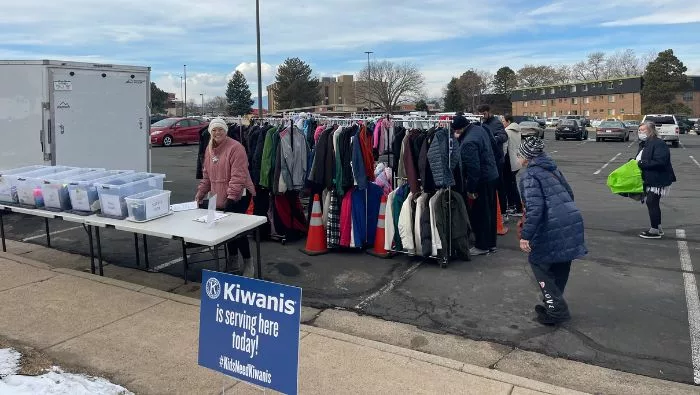Key Clubs around the world receive Youth Opportunities Fund grants from the Kiwanis Children’s Fund.
By Erin Chandler
Key Clubs are making a difference in their schools, their communities and the world — and their impact should not be underestimated. The Kiwanis Children’s Fund established the Youth Opportunities Fund to provide resources that help Key Club service projects reach their full potential.
This year, the Children’s Fund awarded Youth Opportunities Fund grants to 43 Key Clubs around the world — 25 of them totaling US$1,000 or more. Of all the projects receiving grants, more than half provided essential supplies to vulnerable people in clubs’ communities. Some projects helped clubs improve their schools, transforming them into better places to learn. Others supported Key Club members in mentoring younger students. And some projects stood out for focusing on fun and creative events.
The following, in no particular order, are the top 15 projects as determined by representatives of the Key Club International Board and the Children’s Fund:
ElevateEd: STEM in the Himalayas
Key Club of Kathmandu, Nepal
With a series of code camps and robotics workshops, the Key Club of Kathmandu is bringing a practical approach to STEM education into Nepal’s secondary schools. Led by Key Club members and volunteers with expertise in STEM fields, the workshops will help students of all backgrounds apply concepts they have learned in class to hands-on projects. In addition to developing vital skills in scientific fields, participants will learn teamwork and how to present their projects in exhibitions.
“Key to Sweet Dreams” Bedtime Kits
Key Club of Boyd County High School, Kentucky, U.S.
Every year, the Key Club of Boyd County collects donations and holds drives to gather enough new sheets, blankets, mattress covers, pillows, stuffed animals, books, night-lights, alarm clocks and hygiene products to make 125-250 “bedtime kits.” Their partner organization, Ashland Build-A-Bed, then builds a corresponding number of twin beds and purchases mattresses for children ages 2-18 in the five-county area. The Boyd County High School Key Club founded this project in 2019, and this is the fourth time it has received a Youth Opportunities Fund grant.
Blankets From Mae
Key Club of Melvindale High School, Michigan, U.S.
In cooperation with the Kiwanis Club of Dearborn and other area Key Clubs, the Key Club of Melvindale High School has set a goal to make 350 blankets to donate to University of Michigan Health Infusion Services. Chemotherapy and infusion treatments can take multiple hours, and the club’s handmade blankets will make the experience more comfortable for patients. The “Blankets From Mae” project is named for a club member’s mother, who receives infusions at that location.
Helping the Homeless Initiative
Key Club of Hagerty High School, Florida, U.S.
The Key Club of Hagerty High School aims to help the unhoused population in its community by collecting donations of food, toiletries and other essentials — such as blankets and clothes — and distributing them via local shelters. Club members also will make sandwiches for the shelters. In addition to helping those in need, the club hopes to educate classmates about homelessness and compassion.
Walk for Clean Water
Key Club of Hershey High School, Pennsylvania, U.S.
The Key Club of Hershey High School is doing its part to end the global water crisis by partnering with Thirst Project in its Walk for Clean Water. Participants walk 3.75 miles — the same average distance women and children walk in many developing areas of the world to reach the nearest source of water. Funds raised via the Walk for Clean Water will go toward constructing clean wells in the Kingdom of Eswatini.
Care Kits For Kids
Key Club of Desert Oasis High School, Nevada, U.S.
The Key Club of Desert Oasis High School is focusing on helping youth experiencing homelessness in Las Vegas. The club will assemble different types of care kits — hygiene kits containing travel-sized toiletries; holiday gift kits with items such as phone chargers, journals, blankets, socks and more; and snack kits containing canned meats, fruit, granola bars, chips and juice— to offer care, support and hope to young people. The club will donate kits to local homeless and youth centers.
Fulfilling Need With Seeds
Key Club of Fruita Monument High School, Colorado, U.S.
The Key Club of Fruita Monument High School is partnering with the Mesa Club, which designs and builds projects, to establish a hydroponic gardening system at its school. By caring for the garden, students will learn sustainable gardening techniques, leadership skills and responsibility. The club will donate the freshly grown garden produce to families of fellow students in need and to local food banks.
Growing Together Garden
Key Club of Sharon High School, Massachusetts, U.S.
The Key Club of Sharon High School is turning a designated plot in a local community garden into a space where students can join with other community members to learn about sustainable gardening and grow fresh produce. A portion of the food grown in the garden will be donated to local food banks and shelters. The club hopes the garden will become “a vibrant, sustainable and educational resource.”
Life Skills Prom
Key Club of Kewanee High School, Illinois, U.S.
Each year, the Key Club of Kewanee High School holds a prom for students with disabilities in the school’s Life Skills program. In recent years, club members have invited students from neighboring school districts as well. Many of these students are not able to attend the school’s official prom, which occurs on a Saturday evening, so the Life Skills Prom is held in the gym during the school day. Students’ families also attend to take pictures and watch their kids have a blast at an event geared to make them feel included.
Lifeline Meal Packing Project
Key Club of Bay High School, Ohio, U.S.
At least 100 members of the Key Club of Bay High School will participate in a food packaging event for Project Lifeline. Participants will mix, weigh, seal and box meals in a 10-station assembly line, after which the boxes will be shipped to communities in Somalia struggling with hunger and malnutrition.
Packages 4 Preemies
Key Club of Fiorello LaGuardia High School, New York, U.S.
When the Key Club of Fiorello LaGuardia High School learned about the challenges of finding clothes and supplies small enough for premature babies and caring for preemies as they grow, members knew they had to help. Throughout the year, the club will collect care items for premature babies and raise funds for the babies’ families. Club members will package the items and attach handwritten messages of care and encouragement.
Homeless Care Pac-KEY-ges
Key Club of Piedmont Hills High School, California, U.S.
The Key Club of Piedmont Hills High School plans to purchase enough supplies, including shelf-stable food and personal hygiene items, to make 100 care packages for people experiencing homelessness. Club members will hold a service event to assemble the packages, which they will donate to local shelters.
Suzy Foundation Walk
Key Club of Tempe Union High School, Arizona, U.S.
The Key Club of Tempe Union High School plans to raise funds for the Suzy Foundation, which provides medical equipment for children with disabilities, with a carnival located around the school’s athletic track. Attendees will be able to purchase food and play fun games. The Suzy Foundation is named for a current student in the Tempe Union High School district.
The Nepean Annual Spaghetti Dinner
Key Club of Nepean High School, Ontario, Canada
The Key Club of Nepean High School’s annual spaghetti dinner event serves two purposes. First, it raises funds for the Children’s Hospital of Eastern Ontario via a silent auction of items donated by local businesses. It also welcomes the incoming class of new students and their families with a delicious dinner, engaging them in the school community for the first time.
 Winter Blitz 2023
Winter Blitz 2023
Key Club of Clackamas High School, Oregon, U.S.
The Key Club of Clackamas High School (left), teams up with the Key Club of Adrienne C. Nelson High School for its Winter Blitz project to collect essential items — including food, clothing, furniture, toiletries and toys — for local families in need. The project has been held each winter for the past 26 years. It helped 631 families last year alone.
How to get involved
Does your Key Club have a project idea that could benefit from a Youth Opportunities Fund grant? Learn more about the grant and how to apply on the Key Club website. If your Kiwanis club does not yet sponsor a Key Club, learn about the advantages of chartering one today on the Kiwanis Service Leadership Programs page.




